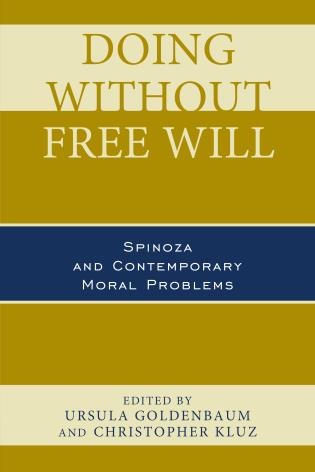Recente studies over Spinoza's sociale theorie (en de relatie 'wijze – menigte')
Naar mijn indruk is er de laatste jaren, vooral sinds de boeken van Michael Lebuffe (From Bondage to Freedom: Spinoza on Human Excellence, 2007) Matthew Kisner (Spinoza on Human Freedom. Reason, Autonomy and the Good Life, 2010), Andrew Youpa (2010), en Matthew Kisner & Andrew Youpa (Eds.) (Essays on Spinoza's Ethical Theory, 2014) die alle vooral het accent leggen op de ethische kant van Spinoza’s filosofie ofwel Spinoza’s ethische theorie, meer aandacht gekomen resp. aan het komen voor Spinoza’s sociale filosofie. Zo worden concepten als ‘de wijze’ of ‘de vrije mens’ (en zijn relatie tot de menigte), individuatie (als transindividuatie) en ‘relationele autonomie’ opnieuw doordacht.
Werd in het verleden sterk op de individuele kant van de Ethica gewezen (de conatus en het pogen tot zelfbehoud van elk individu), de laatste tijd zie je
veel meer aandacht ervoor dat Spinoza juist ook voor dit pogen om in z’n bestaan te volharden en vrij en
wijs te worden, alle aandacht heeft voor het hebben van (juiste) relaties. Ook
de wijze kan niet zonder anderen, zonder de samenleving.
Ik wijs hier op enige recente artikelen die ik de laatste
tijd tegenkwam en die ik, als ik een reader over Spinoza’s sociale theorie zou
mogen samenstellen, daarin zou willen opnemen. Aanbevolen dus.
 • Matthew Homan, “Rehumanizing Spinoza's Free Man.” In:
Ursula Goldenbaum & Christopher Kluz (Eds.), Doing without Free Will. Spinoza and Contemporary Moral Problems. Lexington
Books, 2015 [cf. blog] – academia.edu
• Matthew Homan, “Rehumanizing Spinoza's Free Man.” In:
Ursula Goldenbaum & Christopher Kluz (Eds.), Doing without Free Will. Spinoza and Contemporary Moral Problems. Lexington
Books, 2015 [cf. blog] – academia.edu
• Ravven_Heidi, FROM FUSION, CONFUSION, AND FRAGMENTATION TO
MORAL INTEGRITY: Spinoza's Path from Imaginative Transindividuality to
Intuitive Relational Autonomy – academia.edu
Over “the relational character of
the cognitive–affective-social life governed by the Imagination.” Conclusion:
Rather than a weak and attenuated version of Relational Autonomy understood as
a theory in which social relationships are merely needed %y the individual for
her autonomy to play out effectively, Spinoza's philosophical vision suggests a
stronger version according to which transindividual relations are constitutive
of persons at every stage of cognitive-affective development, on the one hand,
and an infinitely expansive internal self-constitution of the individual by her
(causal) relations is a necessary condition of her very fulfillment of the end
of autonomy and individuation, at and as the highest level of personal
development. Seen from an alternative perspective as the achievement of
individuation, the fullest individual causal self-explanation, that state of
infinite relation, is not only necessary but sufficient.
 En het volgende van een jonge Spinoza scholar aan de afd.
filosofie van Marquette University [cf.],
die na haar dissertatie in 2009, Individuals,
Power and Participation: Metaphysics and Politics in Spinoza, al heel wat
artikelen over Spinoza’s filosofie heeft geschreven [cf. PDF
met haar cv]. Hier wijs ik vooral op haar boeiende artikel in het Braziliaanse
Revista Conatus [cf.].
En het volgende van een jonge Spinoza scholar aan de afd.
filosofie van Marquette University [cf.],
die na haar dissertatie in 2009, Individuals,
Power and Participation: Metaphysics and Politics in Spinoza, al heel wat
artikelen over Spinoza’s filosofie heeft geschreven [cf. PDF
met haar cv]. Hier wijs ik vooral op haar boeiende artikel in het Braziliaanse
Revista Conatus [cf.].
• Ericka Tucker, “Spinoza's Social Sage: Emotion and the
Power of Reason in Spinoza’s Social Theory”. In: Revista Conatus, Vol 9 July-2015
– academia.edu - cf. ook PDF bij Revista Conatus.
Een citaat: “In Spinoza et la politique, Etienne Balibar
argues that there is a tension that emerges in Spinoza between the individual
seeking reason and the multitude – the society in which the individual finds
him or herself. Balibar argues that this tension betrays Spinoza’s distrust and
fear of the common people and the passions.85 Balibar is not wrong about this tension.
Indeed, Spinoza offers evidence in Proposition LXX of the Ethics Book IV: “The
free man, who lives among the ignorant, strives, as far as he can, to avoid
receiving favors from them.” [..] That Spinoza’s theory identifies and indeed
accurately predicts that there will be such a real tension is a credit to the
theory. The solution Spinoza devises for this tension is what we ought to
examine in order to discern his true view of the common people. This solution
is twofold: on the one hand, we need to educate and improve the conditions of
the common people. On the other hand, he argues we must include them in
politics, and indeed change our form of government to be as democratic as
possible. More democracy, and more education are necessary, Spinoza argues, to
eliminate the tension between the sage and society.”

